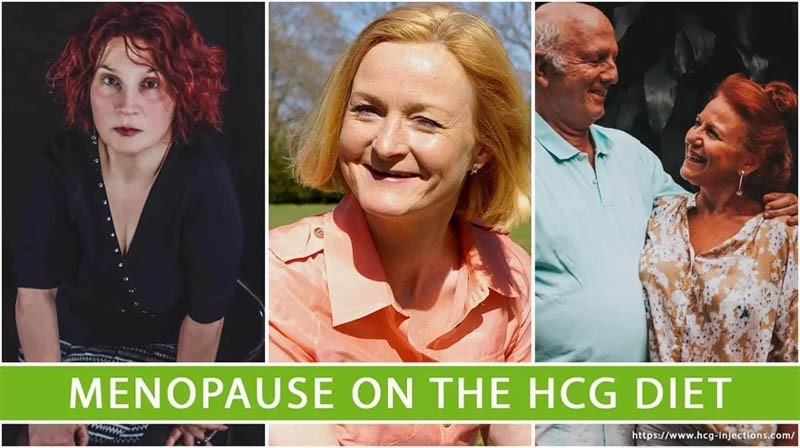Menopause on the HCG Diet

Menopause literally means the end of menstruation, a shift in women’s endocrine physiology that happens during “mid-life”. And for most women, menopause comes with many uncomfortable changes in the body such as hot flashes, insomnia, night sweat, mood swings, and low energy. One of the biggest physical changes that most menopausal women often complain about is the unwelcome weight gain around the middle. The unwelcome weight gain is often the most stubborn fat that refuses to budge despite doing a great exercise regimen and a stellar diet plan. As you age, it gets more difficult to lose weight too mainly due to your diet, lifestyle, and hormonal changes. The HCG diet can offset these problems. In fact, many dieters have experienced menopausal weight gain have had successful results with the HCG diet. The HCG Diet during menopause
The HCG diet is very effective in combating weight gain even for menopausal women. It has an incredible effect on menopausal weight gain. It helps menopausal women improve weight loss and learn ways to keep the weight off. The combined fat burning effect of the HCG hormone and the restricted calorie intake is very effective in helping menopausal women shed pounds. As a prohormone, the HCG may even help restore hormonal abnormalities experienced during the menopausal period. It can slightly raise the estrogen levels which can be beneficial for menopausal women during the HCG Diet.
Menopause and weight gain
Women are at high risk of weight gain during menopause because of so many factors. Now, what exactly happens during the menopausal years?
- Lower estrogen and progesterone level
As you slowly transition into the menopausal period, your ovaries age, and gradually releases fewer hormones. Your ovaries can no longer perform their usual function in regulating the hormones estrogen, testosterone, and progesterone. As this happens, the hormones in your body go into fluctuation because your body is adjusting to the changes.
The reduced estrogen level can lead to weight gain. The decline can start from around the age of 45 to 55 but every woman has a different decline. The reduced level of estrogen causes the fat cells to become large which then leads to weight gain. The same goes for progesterone. A decline in the progesterone hormone can result in weight gain.
- Physiological and metabolic changes
These changes can greatly impact on your body’s composition. As you age, your muscle naturally decreases to while your body fat increases. Aging is inevitable, yet, lifestyle is another factor that you need to have control over. As aging sets in, women tend to slow down their level of physical activity. Less movement means lower muscle function. Lower muscle function means decreased metabolism which could lead to fewer calories burned.
- Elevated nighttime cortisol level
Cortisol levels can go a little haywire during menopause because the adrenal gland takes over the production of estrogen. Cortisol hormone helps the body prepares for the stressful situation but the continuous release of cortisol results in fat accumulation in the midsection. Hormonal shifts during menopause result in higher stress levels.
- Low levels of leptin
Leptin levels decline significantly during the menopausal period regardless of the amount of fat mass. Leptin, also known as satiety hormone is created in the fat cells. When leptin is low, it signals hunger and you eat more but burn less. A significant decline in the leptin hormone can trigger hunger.
Ways on how the HCG Diet can ease menopause symptoms
There is so much you can do to ease the menopause symptoms during the HCG diet.
- Eat less: Good thing that on the HCG diet, you are required to restrict your calorie intake up to 500 calories a day. This can help reduce your weight almost immediately. Eating less can help decrease menopausal weight gain. If you are off the diet, try decreasing your calorie intake around 200 to 300 calories a day. Pay attention to what you eat and eat only when you are truly hungry. Stop when you think you are full.
Remember that your metabolism is not the same as you used to have when you were in your 30s. You will definitely gain weight during menopause when you eat the same amount of calories as you did before. You also may not be as active as you used to be, making it easier for you to put on weight.
Choose nutrient-rich foods like whole grains, fruits, veggies, healthy fats, and clean protein.
- Move that body: The HCG diet protocol encourages appropriate exercise in the form of light walking, cycling, swimming, and yoga. When you are off the diet, make sure that you move your body. Do what you can and make it a habit. It’s non-negotiable because physical activity has a very strong impact on your weight during the menopausal period.
- Practice good sleeping habits: One of the most common symptoms of menopause is insomnia. Insomnia happens because of the decline in the estrogen level. Traditional treatment includes getting hormone replacement therapy and taking medications. Aside from these, the following practices may help ease sleep problems during menopause:
- Avoid excessive caffeine
- Maintain a regular bedtime schedule
- Avoid naps during the day
- Exercise regularly
- Keep your bedroom cool and well-ventilated
- Wear loose clothing during bedtime
- Learn how to manage your stress: You can’t avoid stress but you can handle them. You can manage your stress. Remember that too much stress can result in an increased cortisol level. Increase cortisol level means more fat accumulation in the midsection.

